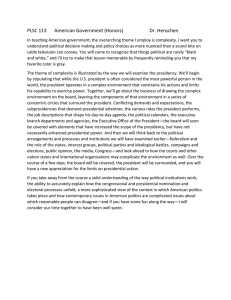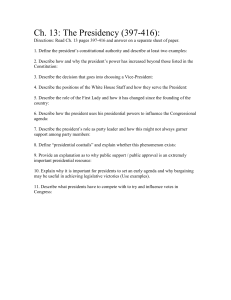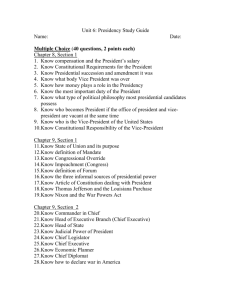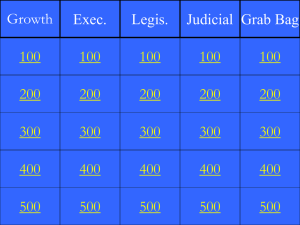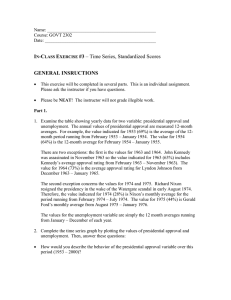Presidential Approval and Unemployment, Eisenhower to Clinton 90 80
advertisement
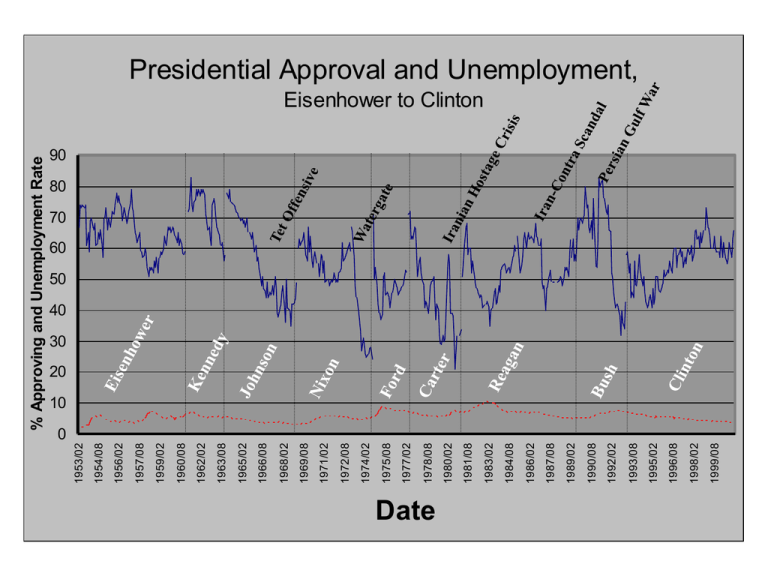
Date 1999/08 1998/02 1996/08 1995/02 1993/08 1992/02 1990/08 1989/02 1987/08 1986/02 1984/08 1983/02 1981/08 1980/02 1978/08 1977/02 1975/08 1974/02 1972/08 1971/02 1969/08 1968/02 1966/08 1965/02 1963/08 1962/02 1960/08 1959/02 1957/08 1956/02 1954/08 1953/02 % Approving and Unemployment Rate Presidential Approval and Unemployment, Eisenhower to Clinton 90 80 70 60 50 40 30 20 10 0 Date 1999/08 1998/02 1996/08 1995/02 1993/08 1992/02 1990/08 1989/02 1987/08 1986/02 1984/08 1983/02 1981/08 1980/02 1978/08 1977/02 1975/08 1974/02 1972/08 1971/02 1969/08 1968/02 1966/08 1965/02 1963/08 1962/02 1960/08 1959/02 1957/08 1956/02 1954/08 1953/02 % Approving and Unemployment Rate Presidential Approval and Unemployment, Eisenhower to Clinton 90 80 70 60 50 40 30 20 10 0 % Approving and Unemployment Rate (standardized) -1 -2 -3 -4 Date 2000/08 1999/01 1997/06 1995/11 1994/04 1992/09 1991/02 1989/07 1987/12 1986/05 1984/10 1983/03 1981/08 1980/01 1978/06 1976/11 1975/04 1973/09 1972/02 1970/07 1968/12 1967/05 196510 1964/03 1962/08 1961/01 1959/06 1957/11 1956/04 1954/09 1953/02 Presidential Approval and Unemployment, Eisenhower to Clinton 4 3 2 1 0 Public Expectations of Presidential Performance Explanations for the “honeymoon effect”: • the “media presidency” - the idea that the news media, particularly TV news coverage, exaggerates the power of the presidency • the “textbook presidency” - the idea, fostered by textbook treatments of the presidency, that the office has a large number of specific powers to wield or roles to play: -head of state -chief executive -commander-in-chief -chief diplomat -chief legislator -crisis manager -protector of the people -manager of prosperity/economy -leader of the free world -chief of the party -head of government -voice of the people -chief policy-maker Constitutional Basis for Presidential Power •Framers’ intent •Constitutional powers -act as administrative head of nation/chief executive -serve as commander-in-chief -convene Congress in special sessions -veto legislation -nominate other executives, judges, ambassadors, etc. -negotiate treaties -grant pardons •Two theories of presidential power -literalist theory -stewardship theory The Myth versus the Reality of Presidential Power • The myth of presidential power is that somehow great powers have accumulated in the institution of the presidency • Three adjectives best describe the reality of presidential power: -personal -episodic -negative [based on H. Mark Roelofs, Ideology and Myth in American Politics: A Critique of a National Political Mind, 1976: 164-175.]
